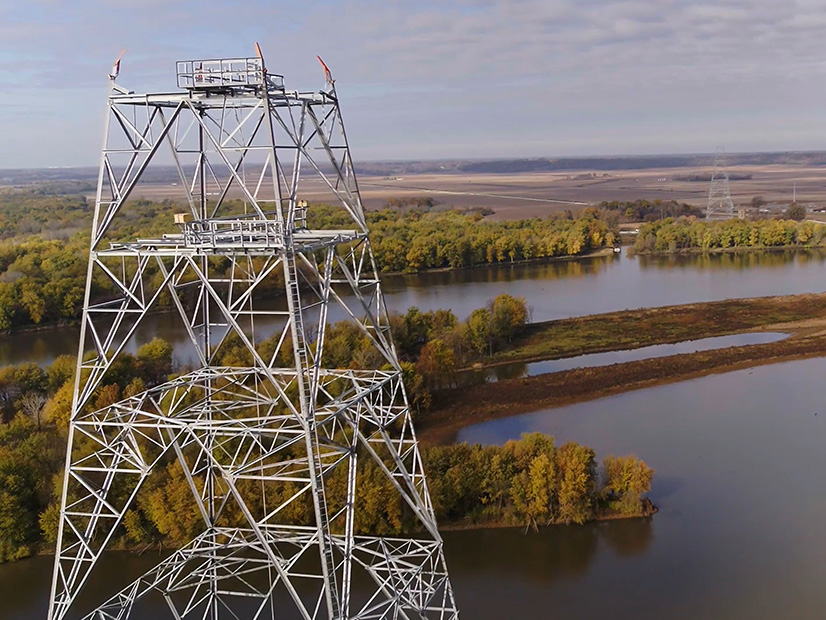State legislatures in MISO’s footprint are undertaking a flurry of activity on right-of-first-refusal legislation as major transmission planning surges.
In Mississippi, ROFR legislation has cleared both houses of its legislature and is set to be signed by the governor later this month. Missouri and Kansas are currently mulling adding ROFRs for their utilities.
Eight MISO states already have ROFR laws, which give incumbent utilities first crack at transmission construction: Indiana, Iowa, Michigan, Minnesota, Montana, the Dakotas and Texas. Wisconsin lawmakers have considered one but haven’t passed it.
Montana had debated whether to revise its ROFR law to include lines constructed in a “federally recognized reliability organization” instead of a “midwest reliability organization,” as is currently worded. But on Wednesday, the state’s Senate Energy and Telecommunications Committee voted 11-1 to table the bill (SB 353).
Minnesota is looking into repealing its ROFR law. Had it not been for the legislation, MISO would have opened the $115 million, 50-mile, 345-kV Huntley-Wilmarth line to competitive bidding in 2016. Cost overruns related to a routing change pushed construction estimates beyond $150 million in 2020. (See Major MISO Tx Projects Face Various Hurdles.)
Indiana’s latest ROFR revision has cleared the House of Representatives and is before the Senate. The state currently maintains ROFRs for transmission projects within its utilities’ service territories. The new bill will extend that right to interregional projects as well, effectively overriding FERC Order 1000 (HB 1420).
An Indiana state representative recently said MISO has been involved in lawmakers’ proposal to re-establish a ROFR for interregional projects. During a Feb. 7 meeting of the Indiana House Utilities, Energy and Telecommunications Committee, Rep. Edmond Soliday (R) appeared to assert that MISO supported the legislation.
Soliday said he was “amazed” during a recent meeting with MISO executives how an unnamed vice president said, “We need this [ROFR] bill; we need this bill in Indiana.”
“So that’s why we brought it forward,” Soliday said during the hearing.
Soliday did not clarify his comments, nor identify who he was in conversation with after multiple requests from RTO Insider. MISO declined to identify the executive in question.
Through a spokesperson, the RTO reiterated that it is “not a policymaker and does not take positions on legislative matters.” However, Brandon Morris said, “MISO routinely has informational conversations with regulators and policymakers about the potential impacts of new rules or regulations.”
“We do not advocate for legislation, but we do outline the realities of complying with specific laws related to transmission planning and grid operations. We simply provide the facts so they can reach their own conclusions,” Morris said in an emailed statement to RTO Insider.
Indiana Rep. Matt Pierce (D) said his “no” vote on the bill’s advancement came down to his belief that having a “disinterested party like MISO manage the bid process would bring us more robust competition than we might see under this bill.”
The argument mirrors national trends in ROFR legislation. Critics say the laws restrict competition while supporters maintain that the projects are best left to the utilities that understand their systems best.
Ameren Missouri Vice President of Regulatory Affairs Warren Wood said recently in a company advocacy website that his utility supports the legislation because it “is crucial to ensuring Missouri electric utilities are the architects and builders of our state’s transmission projects moving forward.”
Last week, Oklahoma Senate Energy Chairman Lonnie Paxton announced he would not hear Oklahoma’s proposed ROFR legislation, calling it anticompetitive.
Industrial Energy Consumers of America President Paul Cicio said the bill’s failure is a win for consumers.
“Other states considering these anticompetitive and unconstitutional ‘right of first refusal’ bills such as Indiana, Mississippi, Kansas, Missouri and Montana should follow Oklahoma’s example and reject them,” he said in a statement. “With record investment into America’s electrical grid expected in the next few decades, it is vital that states find cost-effective ways to build transmission infrastructure while promoting innovation. Competition is the only way to achieve those goals. The interests of the consumer will win out.” At the time of Cicio’s statement, Montana’s ROFR bill was still being considered.
Cicio’s organization is part of a consumer alliance asking FERC to block MISO and other grid operators from applying “anticompetitive” ROFR laws to their regional transmission planning and cost-allocation processes (EL22-78). The complaint is pending at FERC. (See Consumer Groups File FERC Complaint Against MISO.)
The group said ROFR laws conflict with the commission’s rules on transmission competition and its obligation to establish just and reasonable transmission rates. It asked FERC to prohibit MISO from recognizing state ROFR laws in its $10.4 billion, 18-project, long-range transmission plan. Only about 10% of the portfolio is open to competitive solicitation.
The alliance also includes the Coalition of MISO Transmission Customers, the Wisconsin Industrial Energy Group, Resale Power Group of Iowa, Association of Businesses Advocating Tariff Equity and the Michigan Chemistry Council.


